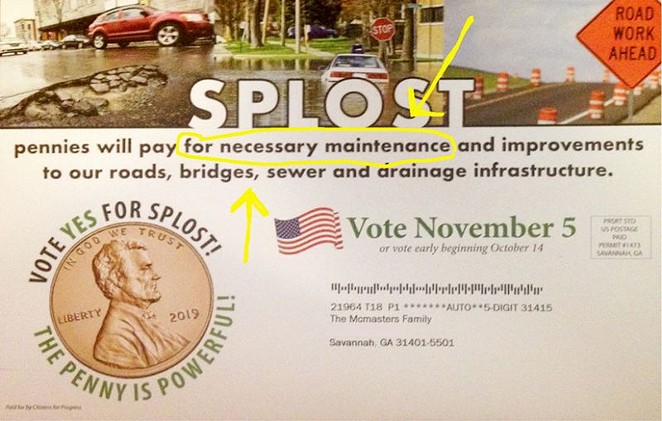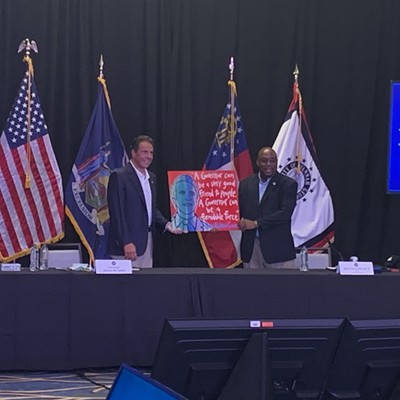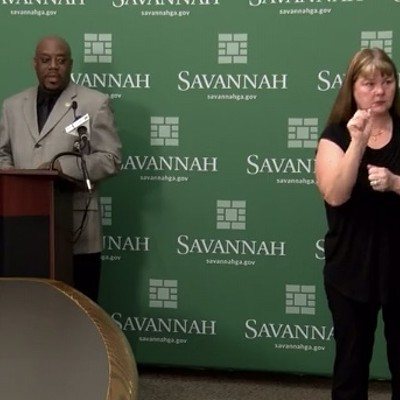IT’S NO SECRET AGENDA that local government would like you to vote "yes" on a other round of SPLOST (Special Purpose Local Option Sales Tax).
In its pure form, SPLOST is basically a good, perhaps great, idea: Use the force multiplier of outside visitors to beef up proceeds from a countywide one-percent sales tax, which will go to capital projects that would otherwise be prohibitively expensive.
When SPLOST was first passed in the mid-‘80s, that’s what it was for the most part: A way to fund necessary infrastructure improvements, such as drainage.
Six rounds of SPLOST later — it comes before voters in six-year increments — the tax has morphed into the second-largest revenue stream for the City of Savannah.
Now, not only core infrastructure gets funded. Neighborhood centers, swimming pools, City Hall renovations, parks, are funded by SPLOST.
Those are nice things, for sure. Some projects, like Tide to Town, are genuinely great and worthwhile.
But much of the project list for SPLOST is well beyond the scope of vital infrastructure that the tax was intended for.
As both mayoral candidate Van Johnson and Savannah alderman Tony Thomas have admitted, smaller, grassroots-level projects are put on the list every six years specifically so that SPLOST will get more voter support in the districts.
In the old days, that was called “pork barrel politics,” though nowadays I’m not sure how many people get the reference.
There’s a lot of pork for everyone, though, not just local politicians.
Private developers, it seems, really love SPLOST as well.
Many of you probably got a mailout from a group called “Citizens for Progress,” urging you to vote for SPLOST.
Citizens for Progress is a Political Action Committee chaired by former State Senate Majority Leader Eric Johnson, lead architect for the Hussey Gay Bell firm.
I’m certainly not saying anything illegal or even unethical is going on. All this is well within legal electioneering bounds.
But ask yourself why a principal in a private architecture firm would want to sway the public’s vote on a sales tax? It belies the notion that better infrastructure is the reason you’re being urged to support SPLOST, and reinforces the idea that SPLOST is now being used more and more to aid and abet private development.
In this year’s round of SPLOST, that would specifically be for improvements to the Springfield Canal, in the so-called “Canal District” being developed in and around the new Savannah Arena.
Now, the City will tell you that drainage improvements are long overdue in that blighted, mostly neglected area of West Savannah. And that is correct.
However, the question begs itself: If such infrastructure improvements are so long overdue, why then did it take the green light for new private development in West Savannah for drainage there to finally be considered important enough to fund?
I said there was nothing illegal in the mailout. But there is something that is arguably intentionally misleading.
The mailout says SPLOST is used for “necessary maintenance” of projects such as roads and sewers.
As the phrase goes, that depends on “what the meaning of is, is.”
By law, SPLOST can’t be used for literal, ongoing maintenance of the projects it funds. While SPLOST funds can be used for so-called “renovation” purposes, the image of a bad road and the word “maintenance” would lead you to believe that SPLOST is how the City fills potholes — which is an almost absurd description of what the tax actually does.
The truth is that private development in the Canal District would benefit greatly from the taxpayers doing the heavy lifting to make the low-lying, flood-prone area more habitable for high-dollar investment.
Many local observers say, not without merit, that it’s useless to speak out against the new Arena project, as it’s a done deal.
But the level of public investment to jump-start private development in the rest of the Canal District is very much still an open question.
And this round of SPLOST goes directly to the heart of the issue of public money going to help private industry.
By one count, over 16 percent of the money collected in this round of SPLOST will go not to necessary infrastructure, but to further enhance the local tourism industry.
(This is arguable, and a lot of that depends on your definition of the tourism industry. For example, Broughton Street is getting another $8 million in streetscaping, mostly to make it look good for tourists — but locals at least theoretically go there too.)
Lest you think I’m picking on Citizens for Progress, they’re far from the only people trying to get you to support SPLOST. The City, the Chamber of Commerce, SEDA, local construction companies, banks and law firms, etc. would like to see it pass again.
And at least we can say the local push for SPLOST is thoroughly bipartisan. The aforementioned Eric Johnson was arguably the most powerful Republican in state government at one point. Another local architect behind several projects benefiting from SPLOST, Patrick Shay, is a former Democratic Chatham County Commissioner.
While personally I’m suspicious of any tax which needs its own well-funded advertising campaign, I’m not saying SPLOST is always necessarily bad.
What does need reform is the state law surrounding SPLOST, to make sure that the public can get ample measurable benefit from anything funded by it.
Even if you usually vote for SPLOST, you can send a message with a “No” vote, and the powers-that-be can simply come to us again next year with newer, better ideas this time around.
You don’t have to fall for scare tactics, and you don’t have to settle for less.































